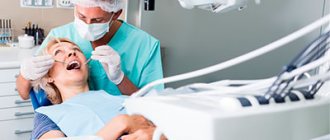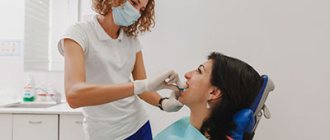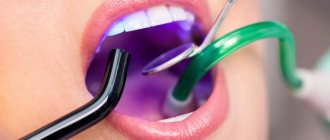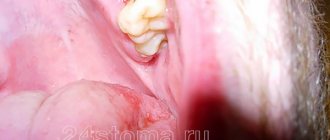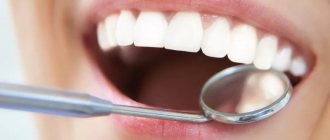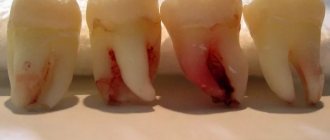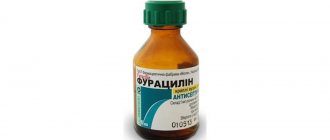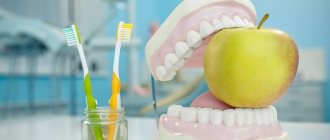Quite a lot of patients who smoke are interested in the question of whether it is possible to start smoking after tooth extraction . Most often, wisdom tooth removal requires creating the right conditions for rapid wound healing. Proper oral care during this period will prevent the exacerbation of pain and the development of various complications. Many patients experience real stress during the procedure and consider a cigarette to help calm their nerves. You can smoke after tooth extraction, however, it is important to follow several rules that will minimize the likelihood of developing an exacerbation.
The essence of the filling procedure
Reference! Filling is a specific method that helps restore the shape and function of a damaged tooth.
First of all, the dentist cleans the cavity of unnecessary substances , and then fills it with filling material .
Currently, technologies make it possible to reduce the likelihood of post-filling complications to zero.
Dentists prefer to use gutta-percha-based .
This is a special biological material that allows you to close any channel, regardless of its width and curvature.
Preparing teeth for filling is carried out in the most usual way. The dentist performs mechanical expansion and frees the cavity from the affected tissue.
This is followed by antiseptic treatment. The doctor uses disposable cellulose-based pins to accurately determine the length of the canal and then dry it.
Therapeutic measures after removal
After removal, the doctor places a tampon in the wound, which is pre-moistened with a hemostatic antiseptic. After 20 minutes, the tampon should be spat out, as the material becomes saturated with blood and becomes a breeding ground for infection.
A blood clot forms in the wound. It will cover it and promote its healing. Do not touch the clot with your tongue, try to pull it out by rinsing or in any other way. This clot should subsequently affect the formation of new bone tissue. The doctor may apply a healing agent to the wound, and after removing a wisdom tooth with overgrown or crooked roots, prescribe antibiotics.
What are the types of fillings and fillings?
Many patients are asked: “What fillings do you want to get?” And in order not to get into an awkward position, you need to understand what kind of fillings exist.
Keep in mind! In dentistry, they differ in composition and use:
- Plastic and ceramic. Plastic ones are the most popular because they are considered cheap and quick to install. Ceramic ones are harder and more reliable.
- Amalgam fillings. They contain silver, copper, zinc, mercury or tin. They are considered ductile, have high strength and can last for several years.
- Temporary and permanent. Temporary ones are used for long-term treatment, and permanent ones are used for instant treatment at a time.
Note! Modern medicine provides several types of materials for tooth filling.
Their main goal is to restore all processes. The material must be selected for the appropriate load:
- Filling of front teeth. Most often, teeth are destroyed due to caries in the front row. This procedure has its own indicators. To avoid future problems with chewing food, a specialist installs light-curing material.
- Filling using paste. Doctors quite often use pastes in their work. They are needed to seal the void after the inflamed pulp has been removed.
- Innovative filling. Such methods include canal sterilization, the use of hot or cold gutta-percha, mummification and retrograde filling.
When should you cancel your visit?
If circumstances arise that prevent you from visiting the dentist at the scheduled time, you can cancel the visit and reschedule it for a later date. It is better to inform the doctor or administrator about this as soon as possible so that it is easier for them to adjust the patient’s appointment schedule.
Cancel your visit if:
- you become ill with ARVI, influenza, or any other infectious or viral disease that may be contagious or interfere with treatment;
- your herpes has worsened;
- the nose is very stuffy (for example, due to allergies), and the stuffiness is not relieved with medication;
- with any increase in body temperature;
- when you feel unwell associated with an increase or decrease in blood pressure.
When can you smoke in different cases after treatment?
Stay up to date! Smoking affects tissue function and impairs regenerative function.
The restoration process is reduced, and a film with pathogenic microorganisms forms on the enamel . They cause secondary caries.
Now every second person turns to a dentist for help to have a tooth filled.
Smokers are not left out. Such people always have one question: “Can I smoke after filling a tooth and how long after can I light a cigarette?”
If the patient cannot resist this habit, then it is necessary to check with the doctor what material is used.
After cement filling
Cement-based material is cheap and short-lived.
For your information! It takes a very long time to harden and will not be able to prevent a new outbreak of caries. It is not recommended to smoke for about five hours.
Temporary plastic filling
Material prone to causing inflammation of the gums. In addition, it shrinks quickly and at the same time affects the shape and color of teeth during eating and smoking.
It is best to refrain from smoking for three hours , although in any case the fillings will lose their appearance.
Photopolymers (light fillings)
Photopolymer fillings are exposed to a special ultraviolet lamp to harden them.
Thanks to this treatment, you can eat and smoke immediately after rising from the dental chair.
Amalgam filling (metal filling)
You should know! This material is used very rarely, as it is toxic. Amalgam is made by mixing mercury and metal.
It is better to stop smoking after filling for a couple of hours to allow the tissues to recover.
Recommendations
After the procedure, your doctor will give you instructions for caring for your mouth. What should you not do after tooth extraction?
- Rinse your mouth and brush your teeth for 24 hours. Otherwise, the clot will fall out of the hole, which will interfere with the rapid healing of the wound.
- Take a hot bath, visit a bathhouse, sauna. A warm shower will be enough. Due to stress experienced by the body after surgery, blood pressure may rise. Moreover, a hot bath can cause bleeding.
- Visit the gym. It is better to avoid physical activity for a while.
- If you have stitches, you should not smile too broadly or open your mouth too much for several days. When you smile, your facial muscles stretch. Stitches may also come apart.
- Eat earlier than two to three hours later. You can only drink warm tea or water after an hour.
- You cannot drink alcohol on the same day.
- It is better to wait a few days with spicy foods. You should also avoid foods that are too hot or cold. The patient should adhere to a gentle diet. Food should not injure the wound or irritate the gums, which have not yet had time to heal. Liquid soups, porridges, and purees are suitable. You need to chew on the healthy side.
- You should not drive after the procedure. Some anesthetics may reduce alertness and cause drowsiness. It's better to call a taxi.
Allowed after surgery:
- If pain occurs, apply an ice cube or cold compress to the cheek near the injured gum. Keep it for no more than 10 minutes every two hours. Compresses relieve swelling.
- Herbal infusion baths will relieve inflammation. You can take a bag of chamomile, put it in a glass, pour boiling water, leave for half an hour, cool to room temperature. Then the liquid is taken into the mouth and held for 2 minutes. Important: do not rinse your mouth!
- Take previously tested painkillers. But you should avoid aspirin and blood thinners. They can cause bleeding.
Smoking a cigarette or hookah is strictly not recommended for patients who have undergone tooth extraction. Giving up these bad habits and following your doctor’s recommendations will help your gums recover faster.
Additional Information
Cigarettes are the culprit of many diseases, including dental ones. Toxic compounds negatively affect the condition of the dentition.
Smoking leads to cracks, yellowing of the enamel, the formation of caries, and also reduces the local immunity of the oral cavity and can cause stomatitis in a smoker or cause discomfort on the tongue.
When can I smoke after having a temporary filling installed?
Temporary filling protects exposed nerves and saves the tooth from subsequent destruction. You can smoke immediately with a temporary filling .
After all, after a week, the temporary material will be replaced with permanent one.
The main thing is to rinse your mouth thoroughly after each cigarette you smoke . You can use special tools.
When can I smoke after having a permanent filling installed?
Remember! To maintain oral health, it is necessary to completely abandon this harmful habit.
If a smoker has permanent fillings installed, then you can return to cigarettes 5-6 hours after the procedure.
How smoking affects teeth - video
Alas, some people in our society are susceptible to a bad habit - smoking. We will not describe the dangers of this habit, and provide evidence of how teeth deteriorate from cigarettes. The article is devoted to a more practical issue - when will it be possible to smoke the first cigarette after tooth extraction surgery.
Tooth extraction at the DaVinci aesthetic dentistry clinic is performed using the most modern instruments and preparations. The patient must be given an anesthetic injection so that he does not feel pain during the operation. But still, tooth extraction is an operation. After it, an open wound will appear in the mouth, the size of which depends on the size of the tooth. Sometimes dentists place drainage and stitches in the gum. The wound will prevent you from eating your usual foods for some time, but if the patient follows all the doctor’s recommendations, then no complications will arise, and soon the hole will stop bothering you.
Useful video
From this video you will learn how the process of filling teeth occurs:
If you are planning to visit the dentist to have your tooth treated, you will have to forget about smoking for about a day. Each person’s body is individual , so the time for the material to harden may take longer.
It is also important to decide on the filling you want to install. After visiting the doctor , your teeth need rest. You will have to refrain from smoking and eating for a couple of hours.
Also, do not ignore the recommendations of a specialist so that the restored teeth can last for decades.
Today, despite modern advances in dentistry, smoking and dental implantation in dentistry remain a big question. This is due not only to the negative impact of this addiction on the body, but also to the constant harmful effects of cigarette smoke on tooth enamel and oral mucosa.
Is it possible to smoke before implantation?
Before dental implantation, you should not smoke for a month to give the mucous membrane the opportunity to recover from burns and dryness and improve blood circulation. At this time, it is recommended to lead a healthy lifestyle, that is, it is advisable not to drink alcohol, eat right and take vitamins to strengthen the immune system. In addition, you need to carefully monitor your oral hygiene.
A month is the minimum period of abstinence from smoking before surgery. Ideally, the longer the better.
The effect of nicotine on tooth enamel
The negative impact of smoking on tooth enamel leads to the fact that implants do not take root well, and the mucous membrane injured after this dental intervention heals very slowly. The negative effects of cigarettes are as follows:
- Exposure to high temperatures from tobacco smoke.
- Thinning of bone tissue due to the influence of tar and nicotine on it.
- Decreased immunity.
- Formation of tartar and yellow plaque.
If you smoke frequently, exposure to high temperatures causes tooth enamel to become thinner over time, becoming brittle and brittle.
Thinning bone structure significantly increases the risk of implant failure and failure. Decreased immunity leads to frequent inflammatory diseases of the oral cavity, including osteomyelitis, which is a common companion for people with a long history of smoking. This makes it almost impossible to place a high-quality implant.
Tartar and dense plaque, which occur if you smoke frequently, are an excellent breeding ground for bacteria, which, in turn, negatively affect the condition of the skeletal system and soft tissues of the oral cavity.
What do you need to know before going to the dentist?
Visiting the dentist is a fear for many. To make your visit to the doctor as effective as possible and to be fully prepared, you need to remember some rules. Specialists at the Happy Smile clinic tell you in detail what you need to know before going to the dentist.
There's no need to be afraid
Modern dentistry has methods of pain relief that reduce discomfort and pain during treatment, prosthetics, and even tooth extraction to zero. Some people are afraid of injections, but even here there is practically no pain, since doctors use the following methods:
- injections are performed with special syringes with thin and sharp needles;
- the injection site is pre-treated with a spray or gel with an anesthetic;
- for easier penetration of the needle, the mucous membrane is dried;
- the medicine is administered gradually, slowly, so that it accumulates at the site of inflammation.
Lidocaine and novocaine in modern dental clinics are replaced by new generation drugs with a more powerful effect, so the patient does not feel anything even with complex molar removal.
When choosing dentistry you need to consider:
- availability of high-quality multi-profile equipment;
- range of services provided;
- professionalism, skill of specialists.
Dentistry Happy Smile is one of the leading dental clinics, where services are provided for treatment, whitening, prosthetics, implantation, and tooth extraction. The medical center employs highly specialized dentists who regularly improve their skills and provide services at the highest level.
Is it possible to eat before going to the clinic?
If the treatment will take place under anesthesia, it is necessary to have a snack. This is due to several reasons:
- Less saliva is produced. Dry mucous membranes are necessary for fillings and diagnosing certain diseases. If a person is hungry, he is provided with increased salivation;
- Immediately after therapy you cannot eat for 1-2 hours, so it is advisable to eat before the procedure so as not to feel hungry later.
Excessive consumption of food is also not advisable before taking it, otherwise nausea and vomiting may occur, especially in people with a sensitive reflex.
Eating is strictly prohibited if the treatment is carried out under anesthesia. The anesthesiologist should tell you detailed rules for preparing for this procedure.
Can I drink alcohol?
Some people believe that if you drink a little alcohol before going to the dentist, dental treatment will not be so scary. In fact, drinking alcohol is strictly prohibited, at least 24 hours before a dental procedure. It can block the action of the pain medication, making treatment painful or even impossible.
It is also worth remembering that the dentist has every right to refuse to treat a patient who is intoxicated.
What should you not do before going to the dentist?
- Try to drown out bad breath with mints, chewing gum and other methods. Odor is one of the diagnostic criteria that in some cases helps the dentist make the correct diagnosis;
- Taking painkillers. If you have to visit a doctor because of acute pain, you should stop taking any painkillers a few hours before leaving home. For a dentist, pain response is important. It evaluates the severity, intensity, and speed of onset of pain when exposed to irritants, and tablets significantly complicate diagnosis.
- Conceal information from your doctor about taking medications, especially blood thinners. Otherwise, there is a high risk of bleeding and other complications. Sometimes the dentist recommends stopping such medications for a while and scheduling a visit for another time.
- Hide information about the presence of an allergic reaction, existing diseases of internal organs, hereditary pathologies, the presence of menstruation, menopause. All this may affect further therapy.
What should you take with you?
You must come to any medical institution with a passport or medical insurance. It is advisable to have SNILS with you in paper or electronic form. Also, be sure to take with you the results of x-rays, previous studies, if they were not carried out in this clinic, conclusions and recommendations of the doctor.
You need to plan your appointment in advance
A trip to the dentist should be planned in advance, otherwise, if the doctor does not have a free window, the patient may simply not be seen. The exception is cases with acute pain. In this case, the doctor cannot refuse an examination.
The duration of the visit depends on the complexity of the procedure. A regular examination lasts on average 15-20 minutes, professional cleaning up to 1 hour, treatment can take more than 60 minutes. It is better to arrive early in order to have time to complete all the necessary documents. If a patient is late or cannot come to the clinic, this should be reported.
When should you not go to the dentist?
It is better to postpone going to the dentist in the following cases:
- the presence of herpes, elevated body temperature;
- viral diseases of the respiratory tract;
- period of menstruation in women;
- nasal congestion or severe runny nose;
- excessive drinking on the eve of the visit;
- bad feeling.
In the office, you should calm down, answer all questions clearly and truthfully, and follow all the instructions of the attending physician. Only in this case will a trip to the dental center be easy and painless.
What can happen after implantation
If a person who has a significant history of smoking cigarettes still decides to have dental implants, then you need to be prepared for the following possible complications:
- Long healing of the wound surface and frequent bleeding after dental implantation are associated with impaired blood circulation. Narrowed blood vessels contribute to the formation of stagnation and suppuration of wounds. If you smoke for a long time, after each puff there is a decrease in pressure in the oral cavity, which leads to disruption of regeneration processes.
- Deterioration of implantation conditions, since smoking destroys tooth tissue, and its significant presence is important for placing an implant.
- Smoking cigarettes increases the risk of developing periodontitis, the occurrence of which is a contraindication to implantation.
- If bone tissue is augmented before implantation, the risk of bone tissue rejection is subsequently much higher among smokers than among those who do not have this addiction.
- Slowing down the regeneration processes when smoking cigarettes causes great discomfort after visiting the dentist, as it makes it difficult to eat food and drink hot drinks. This condition may last for several weeks.
- Excessive salivation and the influence of cigarette tars lead to divergence of postoperative sutures. This necessitates their reapplication. Frequent trauma to the mucous membrane, in turn, can lead to the occurrence of malignant neoplasms.
- The plaque that forms on the enamel of cigarette lovers can also occur on the implant. If it penetrates into the area where the prosthesis is attached to the jaw bone, this will certainly lead to tooth loss.
In addition, if you smoke for a long time, regular exposure to cigarette tar and nicotine causes destruction of the jaw bone, and any intervention affecting it can cause a number of inflammatory diseases.
The above factors lead to a significant reduction in the service life of the implant and increase the risk of developing inflammatory processes. Every smoker who has had a denture installed can tell you about this.
In order to significantly reduce the likelihood of complications, it is recommended to stop smoking three weeks before placing the implant. If this is not possible, then it is advisable to reduce the number of cigarettes smoked as much as possible. In addition, you should refrain from smoking for one and a half months after receiving dentures.
Thus, dental implantation and smoking are practically incompatible. When installing dentures for a heavy smoker, no specialist gives any guarantees, since the negative effects of tobacco smoke cause serious changes in the oral cavity and increase the risk of developing postoperative complications. The only way to improve the prognosis after receiving a prosthesis is to quit smoking.
About smoking after tooth extraction
You should abstain from this bad habit for several hours. Cigarette smoke irritates the wound. Resins and chemicals can slow down the healing process. The minimum is two hours. But if there is bleeding, the time increases by several more hours.
Smoking can cause dry socket formation. There should be a blood clot in the wound. When it falls out, pathogenic microorganisms will easily penetrate the wound and cause inflammation. The body temperature will rise, headaches and malaise will begin. Inflammation can provoke alveolitis.
Interesting: Alveolitis is an acute inflammation of the walls of the socket at the site of an extracted tooth. The disease occurs due to direct injury to the wall of the socket, disruption of the sterility of the wound and blood clotting. Intoxication intensifies along with the development of inflammation. A headache, uncomfortable pulling sensations and muscle aches appear. First, the gums swell, then the swelling spreads to the soft tissues of the face. The gum mucosa becomes cyanotic, and necrosis may develop. Alveolitis can cause osteomyelitis, in which a permanent purulent focus appears in the bone and a fistula forms.
If stitches have been placed, you need to abstain from smoking for 2-10 days, depending on the indications. Within 10 days, the tissue will heal successfully and the stitches will be removed.
